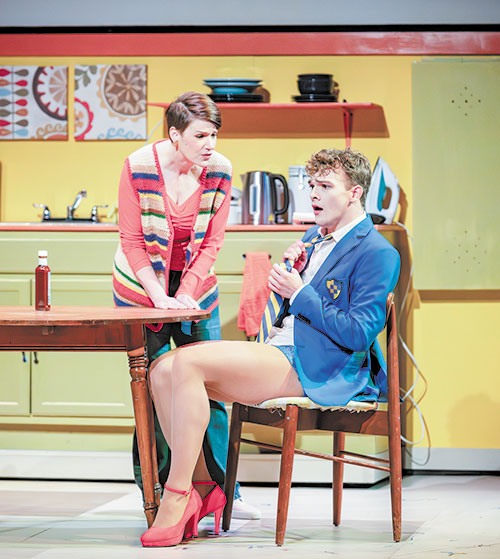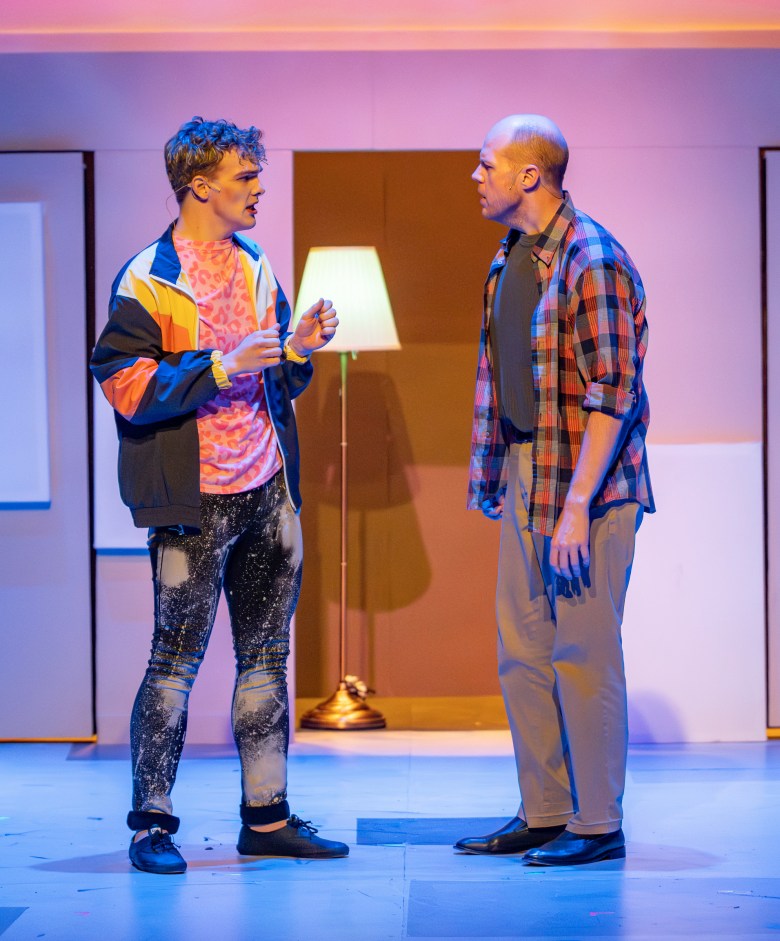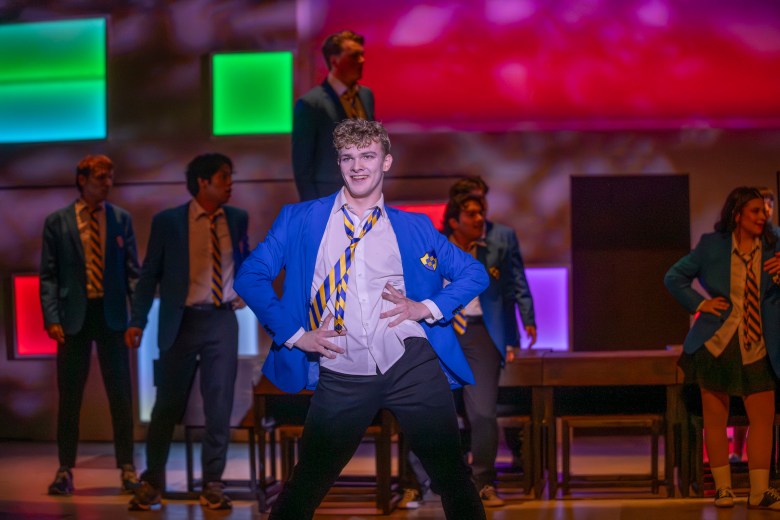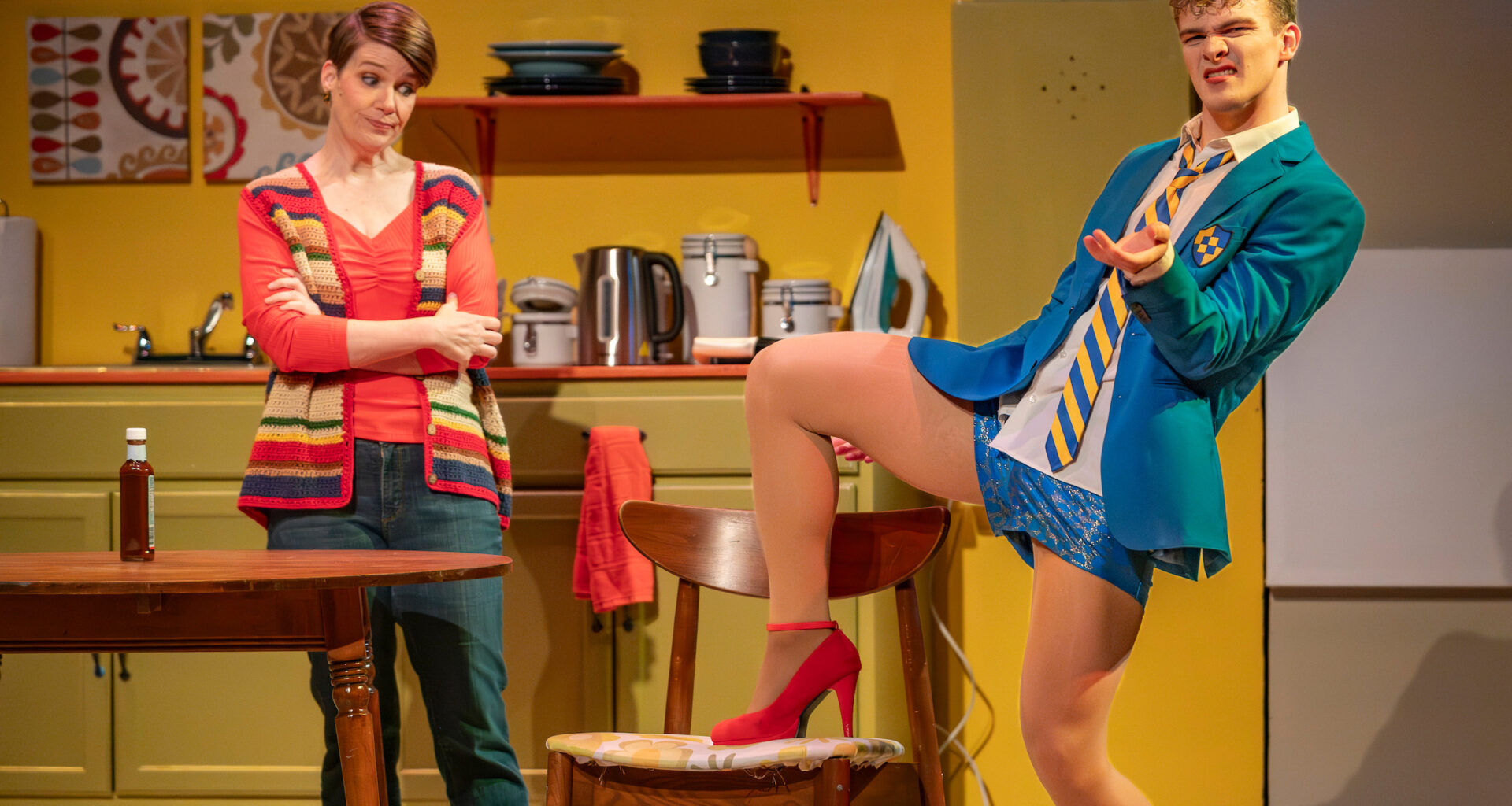Henry Cawood, center, plays a 16-year-old aspiring drag queen in Uptown Players’ production of Everybody’s Talking About Jamie (Photos by Mike Morgan)
RICH LOPEZ | Staff writer
Rich@DallasVoice.com
Editor’s note: This online version differs from the print version. In this update, the actors’ responses, save for slight editing, are left in their original format to questions to expand on the conversation about the themes of family in the musical.
![]()
Last weekend, Uptown Players debuted the regional premiere of the musical Everybody’s Talking About Jamie. Based on true events, the show tells the story of 16-year-old Jamie of Sheffield, England who dreams of becoming a drag queen. His classmates pick on him. His best friend believes in him, and his parents land on either side of the fence.
It’s a story that may ring true to many.
The musical is fun and flashy and certainly centers on Jamie, played by Henry Cawood. But the heart of ETAJ is the relationship the character has with his mother Margaret (Mary Gilbreath Grim) and his father Wayne (Jericho Thomas). She’s supportive and encouraging. He’s very much not.
The three actors discussed their roles and how ETAJ isn’t just a coming-of-age musical but a story about family both chosen and biological.
Dallas theater fans are no stranger to Grim (she/her). The actor has not only been seen on the Uptown stage before in Priscilla, Queen of the Desert and in Ragtime, she has had lead roles in Lyric Stage’s Sweeney Todd and Mamma Mia! She’s also played Violet in Theatre Arlington’s 9 to 5 and has performed at Circle Theatre, MainStage ILC and WaterTower.

The character Margaret has been in her sights. She says this role has spoken to her as a parent herself.
How did you respond to the emotional narrative of ETAJ, particularly regarding parental acceptance?
Margaret is a character that I have wanted to play for a while. She loves her child unconditionally and would do anything for him. But because Jamie’s father pulls away and wants nothing to do with his son, Margaret gets so caught up in protecting Jamie that her little “white lies” snowball and eventually end up hurting Jamie in the long run.
I resonated with how wanting to protect your child at any lengths can lead to overprotection. No parent wants life to be hard for their kid, but life is hard and children have to live it and fall apart so they can learn to put themselves back together.
How did you approach your character’s perspective on Jamie’s identity as his mother?
There is one particular scene where Margaret is shown asking questions of Jamie. As a parent we can get caught up in “teaching”. Margaret is so open to learning from Jamie. As an actor, I really wanted to embrace her open heart and focus on how she is willing to listen to her son and share the important moments with him. This makes it even more heartbreaking when we see her close off real communication about Jamie’s dad.
Playing Margaret, what personal insights or connections did you draw upon?
As a parent of a trans child I have gone through a lot of the same emotions as Margaret. She and I share a very strong bond. She has taught me to be even more honest with my child: To ask questions; to admit that I am the student when it comes to the LGBTQ+ community; and to, most important of all, listen to my child. I am lucky to have a very supportive partner and father of my kid but Margaret’s heart is something everyone can aspire to!
What challenges or rewards did you find in playing your character when it came to supporting Jamie?
It’s a challenge for every show to keep it together and get the songs out!! Margaret’s journey is so emotional but the audience deserves to hear this beautiful music. So it can be a challenge to get the notes out while choking back her tears. You have to try and find the balance. The big final reward (because there are so many throughout) comes for me when I get to watch Henry sing “Your Boy” to me at the end of the show. His character is basically singing his ‘Thank you’ to his mom for all that she has done for him and it is so beautiful and very emotional for me. Henry portrays Jamie so honestly and so beautifully- it is such an honor to watch every time!
Do you find this role has provided you with new self-discoveries?
Wow — do I ever! The love for my child and my acceptance of them has always been strong. But through Margaret I am reminded every night to be honest about not being a perfect human. To admit that you are doing your best and to strive every day to be
Jericho Thomas (he/him) may have been challenged to play such a homophobic father as a gay man. In ETAJ, Wayne has left the family and shuns Jamie. Margaret tries to keep him in his son’s life by sending notes and cards “from” his father. Ultimately, the two have a troubling confrontation. Fortunately for Thomas, his parents were pretty cool.

DV: What was your initial reaction to the themes of ETAJ, particularly regarding parental acceptance?
My first reaction was that the script isn’t interested in redeeming or explaining Wayne in any way. He exists as darkness to Margaret’s light and as a personification of the wall in Jamie’s head. He doesn’t accept Jamie for the wonderful, hilarious, extroverted kind of boy he is. And, unlike most other musical theatre antagonists, his worldview isn’t changed with a song or a speech.
As a gay guy, all of this broke my heart for one big reason: I know this guy too well. We all do. But also as a gay guy, the play’s big themes brought me a lot of joy. I’m proud to be a part of a show that spotlights bravery; personal and community acceptance; and the right to chase your dreams, whatever they are.
How did you approach your character’s perspective on Jamie’s identity, especially given the contrasting views of Margaret and your character?
One of the first rules of acting is empathy. Never judge your character, or you’re sunk. So I approached Wayne with a cautious empathy and created a backstory for him that would inform his worldview: working-class Sheffielder, Christian, straight, football fan, smoker, drinker. In every area of his life, masculinity, boyhood and manhood are typical and uniform. To Wayne, the most sinful, scariest, threatening, disruptive, and confusing thing a male can do is not perform his masculinity. And though I can’t judge Wayne or other characters like him for believing those things, I can recognize his fear, his ignorance, his anger, and his complacency.
What personal insights or connections did you have while portraying a parent grappling with their child’s identity?
I came out comparatively late in life, but I’m grateful that my parents and immediate family pretty much shrugged and moved on. Just the other day, I was on the phone with my mom, and she asked, offhand, in that way only loving mothers of gay sons can ask,
“So no girls? Ever?” And I smiled through the phone, confident in her neverending love for me and replied, “Nope!”
“Welp,” she said, comically defeated. “There are more important things in life.”
My mom doesn’t belt musical theatre ballads like Margaret; but every time she asks if there are any men in my life these days, my heart leaps a little.
My Dad, who I lost last year, loved me ferociously, prayed for me shamelessly, and always told me how proud he was of me. He was a devout Christian, and I think my coming out confused him more than anything. (He was ill at the time, which may have also clouded things.) But thankfully, he never shamed my complexity. He gave his theatre kid the most loving gift he could: parental applause.
Like Jamie, my interest and aspirations always somewhat confounded my parents. But, with them, there was a hands-off, “we don’t understand this, but go for it” kind of support that I found freeing.
I’m not a parent, but I am a public high school theatre teacher. (I often joke that I don’t have kids; I have students.) And while I work very hard to not influence any child’s identity one way or another, I make sure that my classroom is a welcome space to every student. You never know what a kid goes through at home, in the halls, at lunch, or at work. I hear and honor whomever you tell me you are. My motto is simply, ‘What do you need, and how can I help?’
Was there any silver lining to playing your character who wasn’t really the best person?
Not a ton of rewards with this role, unless you count getting to tee up Henry to sing the house down in his 11 o’clock number, “Ugly in This Ugly World!” The challenges with a character like this are always to respect their role as a foil to the main character’s development; to play it truthfully; and to leave him at the theater when you go home.
Are you learning something new about yourself with this role?
I think Wayne can be a lesson and a reminder to all of us: We miss out on life’s best when we choose to fear and reject others.
Playing the titular Jamie is Henry Cawood. To prepare, the 21 year-old thought back to his high school days. Just like Jamie, Cawood (he/him) related to some of his character’s struggles and high points.

DV: How did you prepare for Jamie’s journey of self-discovery and resilience, and what aspects of his character resonated most with you?
In preparation for this role, I found myself thinking back to high school Henry. The good memories, the bad memories, the moments I felt alone, the moments I felt surrounded by community, and the era where I almost only wore thrifted Hawaiian shirts nearly every day and forced a harsh side part by combing my curls to one side of my head because I felt it was “my brand.”
ETAJ is a fabulous coming of age and coming out (twice) story that encapsulates the essence of these experiences as Jamie New tries to live as his truest self. The good and bad times, the loneliness and connection, and the questionable fashion choices are all part of those formative high school years. Though Jamie makes some missteps along the way as he tries to figure himself out, I greatly admire his brazen nature and ability to push the envelope in order to be himself. Jamie’s journey of self discovery is something I feel almost anyone can relate to in one way or another.
Considering the strong family relationships in ETAJ, how did you approach the dynamic with his mother and the impact she has on him to embrace his true self?
In shows about identity, it is not too often that you find such a supportive parental figure. This is something truly special in this ETAJ. Jamie’s mother, despite her fears and doubts, is hellbent on ensuring that her son is never ashamed and always feels safe to be his truest self.
For most of the show, Jamie, like many people his age, does not fully recognize or appreciate the sacrifices his mother makes for him. It was important to me that I focused on this in my performance, as I feel it truly grounds him in his youth. Working with Mary is an absolute joy. Some performers have this presence of professionalism and talent about them, and that is certainly true for her. She never fails to land the punch emotionally, and playing off of her not only elevates the gravity of this material but also makes me feel so safe and supported onstage.
What do you feel the musical communicates about the importance of family, biological and chosen, regarding acceptance and empowering individuals to live authentically?
While the musical does follow the story of one boy working to become his truest self, it recognizes the involvement of others in that process beautifully. ETAJ embraces the importance of community and external support. Too often, I fear we can fall into the trap of feeling like we are alone and have to support ourselves. This musical is a poignant reminder that it is vital to lean on your community, whether that is biological family or found family. This show has helped me reflect on my own relationships and filled me with gratitude for the support I have received in my life.
How do you describe the audience’s reactions so far to your performance as Jamie?
It has been encouraging to hear stories of people being moved by this piece. It truly is so full of heart, and I am glad that so many audience members have connected with the story. That is what theatre is supposed to do, and certainly, that is what Uptown Players aims to achieve with all of their productions. To be a part of a show that has the potential to move others so deeply is an honor.
Which song has resonated most with you?
“Wall in My Head” is the second number in the show, and offers the audience an intimate glimpse into the psyche of Jamie as he sings about his desire to become something more–to climb “over the wall” in his head. The resolution of the song is nothing grandiose; it is rather tame as far as musical numbers go. No ginormous change is made, and that is the beauty of the song.
Although I am no longer in high school, I still have moments in my life that mirror the arc of “Wall in My Head.” Moments where I ruminate over a struggle, allowing thoughts to swirl in my head and letting those fears dictate my life. This song does a wonderful job of capturing the fear and hurt that the past can have on a person. I look forward to the climax of the song each night.
While singing about these racing thoughts and reaching the quiet and small moment of resolution, the rest of the cast joins in vocally from offstage, which I feel serves as a touching reminder that even in moments where you feel hurt, alone, and lost in your own head, your community is there and has your back through those struggles, even if you can’t see it in the moment.
The show runs through Aug. 3. For tickets, visit UptownPlayers.org. This interview has been edited for format and length. For the full and unfiltered Q-and-A with the cast, visit DallasVoice.com.
Related
